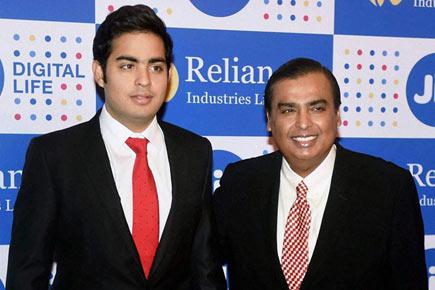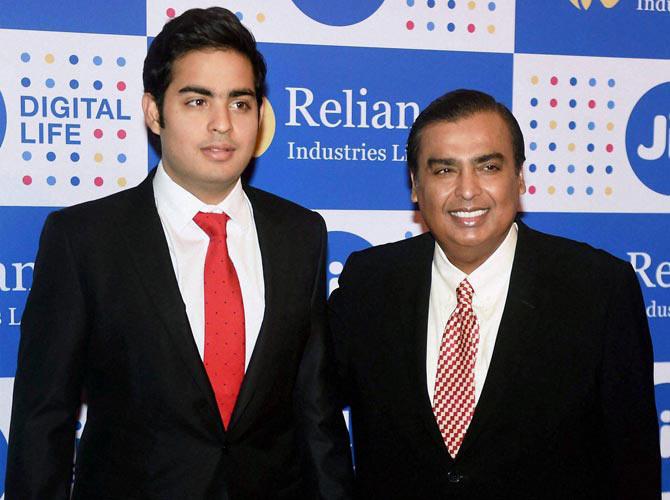The eventual tariff for Jio 4G services announced by Reliance Industries Chairman Mukesh Ambani, which has a surprise element of free domestic calls with no roaming charges, is just right to capture a large share of India's telecom and data market pie, analysts maintain

Mumbai: The eventual tariff for Jio 4G services announced by Reliance Industries Chairman Mukesh Ambani, which has a surprise element of free domestic calls with no roaming charges, is just right to capture a large share of India's telecom and data market pie, analysts maintain.
ADVERTISEMENT

Mukesh Ambani, Chairman, Reliance Industries Ltd. with his son Akash Ambani at the company's annual general meeting in Mumbai on Thursday. Pic/PTI
"While most of the monthly plans are targeted at the higher end users -- of an average revenue per user of over Rs 500 per month, versus the current Bharti Airtel figure of Rs 196 -- the Rs 149 plan is right in the mass market segment," said Credit Suisse in its latest analysis, referring to the Jio's base tariff for a regular user.
Putting it in a perspective, the leading financial services group said the average Bharti Airtel customer today spends Rs 196 per month, consumes 414 mins of voice (for incoming and outgoing calls) and gets 200 MB of data. Under Jio, this average customer gets unlimited free voice, and 50 per cent more data for 25 per cent lower monthly spend.
There are other incentives as well, especially for higher-end users and students. This apart, Reliance Jio is deploying wifi hotspots at key locations nationwide and Jio customers will have access to them, besides free access to all of Jio's content library, including live and stored TV, movies, songs, magazines and newspapers till December 31, 2017.
The analysis comes against the backdrop of Reliance Jio announcement on Thursday that domestic phone calls from its network will be free forever, with zero roaming charges, along with a four-month introductory offer for everyone of a zero-tariff voice and data services, beginning on September 5. It also announced tariffs that are well below what customers are charged today.
"Jio's focus likely will be to retain majority of these subscribers (over five million that Jio is currenty said to have) when they commercially launch Jio offerings -- first as a secondary SIM, and then over time, by offering better network/value proposition as primary SIM," said leading investment banking firm Bank of America Merill Lynch.
"In our view, incumbent telecom companies would not aggressively match Jio's offering, but try to be at a mild premium to Jio, thereby providing some space for Jio to gain market share. Else, it would lead to Jio getting more aggressive to gain traction but at the cost of impacting industry profitability/returns."
Another global investment research firm, Bernstein said Jio's Rs 499 plan is slightly above the average revenue per user base in India.
"This is the right initial market for Jio to target, and the promise of unlimited voice and text, plus content, apps and other add-ons will make the Jio offer quite attractive versus what they have today," it said.
The research firm also said the entire base of those who pay Rs 493 per month revenue is only 51 million and that the competitive responses taken by Bharti Airtel, Vodafone and Idea Cellular -- the three top incumbent players -- will ensure they don't collectively lose this entire segment.
"Our own analysis, based on current 4G spectrum holdings suggests, Jio could capture up to 44 per cent, allowing them (the existing players) to win 22 million users from this cohort." Bernstein also said average data users in India currently consume around 800 MB per month -- so the 300 MB Jio offer at the base would be a step backward for most of them.
"Our expectation is that the data explosion is just beginning and 300 MB will be far too low for any real 4G users."
Looking ahead, the research firm said other players are doomed. "For the others, this is the beginning of the end game. India will rapidly switch to 4G and any operator incapable of competing in this segment is doomed to eventual failure," it said.
"We remain doubtful that Tata, Telenor and the other marginal players stay in the game much longer. Their best hope is to seek a partner who might be willing to consolidate their base for a small equity share."
 Subscribe today by clicking the link and stay updated with the latest news!" Click here!
Subscribe today by clicking the link and stay updated with the latest news!" Click here!






